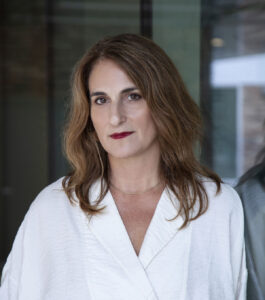Celebrating faculty: Jennifer Gilmore
 What is the focus of your research/area of expertise?
What is the focus of your research/area of expertise?
The focus of my research is the writing of fiction, and I consider myself first and foremost a novelist, but I also write essays, short fiction, critical work, and screenplays. I’ve published five novels, including The Mothers, which was featured on “Fresh Air” and is currently being adapted to film; Something Red, a New York Times Notable Book; and Golden Country, a New York Times Notable Book and a finalist for the National Jewish Book Award, the Los Angeles Times Book Prize, and the Harold U Ribalow Prize. I have also written two novels for teens, We Were Never Here and If Only, both published by Harper Collins. I have written for a wide variety of magazines and journals as well, including The Atlantic, Bookforum, Harper’s Magazine, the Forward, the Los Angeles Times, New York Magazine, The New York Times, Real Simple, Salon, The Washington Post, and Vogue. A recurring theme in my work is what happens to families and individuals over time and how each generation is both haunted and invigorated by the past. My work varies widely with each project but tends to consider the integration of history and literary history, the use of archives and contemporary fictional techniques with a feminist perspective.
How do students benefit from your scholarship and research?
Most of my classes are creative writing classes, so they are workshop-based, which means student work centers the class and critical feedback and revision is a huge part of the work we do together. We also read texts by published writers that support our own work and let us see the writers’ use of many of the elements we are struggling with, or perhaps nailing, in our own work. Being a writer depends on being a reader. I joke with my students that my goal is to ruin reading for them, and it’s true: Every time they pick up a text, I want them to think about how it was built and the effects of the writer’s decisions on the reader’s experience. I am in the trenches with my students, asking them the same questions I ask myself: Why did I use first person here? Is this narrative distance too large? Is there enough interiority? Too much? Every book teaches you how to write it, so while I am an authority in certain ways, no one is really an expert when it comes to writing fiction and creative nonfiction. With my screenwriting students, we are exercising different muscles, as there is a paradigm we follow in feature film, but why do we follow it? How can we make it as effective as possible? And how can the form showcase what our characters want and how they go about getting it? I have worked on the craft of writing and in the world of books for a long time, and I know how hard it can be to get the beautiful story/essay/screenplay/novel you imagine to the page. I am here to help facilitate that incredibly rigorous process for my students.
Another large part of my teaching involves bringing a host of readers to campus. Fiction is the filter through which I see the world, and it is a great tool to learn about the world. Myself and my creative writing colleagues are committed to bringing all kinds of voices to our students through our many reading series, student contests, and events.
What will you be teaching in the fall?
In the fall I’ll be teaching ENG 151: Introduction to Creative Writing, which allows first- and second-year students to experience writing and reading in several different genres and introduces them to the writing workshop. I will also be teaching ENG 366: Writing the Novel. This is a class I have just developed for advanced students, some who have already taken ENG 362: Advanced Fiction, where we focus on short fiction. While I know it’s almost impossible for anyone to write a novel in 14 weeks, students can begin to calculate what makes a novel, what their material is, and why they want/need to write it. We can learn how to develop characters and move the narrative forward, to use immediacy in our prose, and learn how to sustain a long-form writing project while maintaining word economy and sustaining a voice. We will be reading several contemporary novels as well, and looking closely at the craft, including the mapping of their structures so that we can discover our own. My hope is students will have the tools to finish their projects when the class is done, should they choose to. I’m so excited for this course, and I’m hoping to write along with my students as well.